Overview
Navigating the process of securing VA disability benefits for Irritable Bowel Syndrome (IBS) can feel overwhelming. We understand that many veterans face challenges in this journey. It’s essential to know that you are not alone in this process.
To help you, we want to highlight some crucial steps:
- Thorough documentation is vital. This means gathering all necessary medical records and evidence to support your claim.
- Understanding the VA rating criteria is equally important, as it can significantly affect the outcome of your application.
- Additionally, leveraging support resources can make a difference. There are numerous organizations and individuals ready to assist you through this process.
Remember, seeking help is a sign of strength, not weakness.
By following these steps, you can enhance your chances of receiving the benefits you deserve. We’re here to help you every step of the way. You have the right to the support you need, and with the right approach, you can successfully navigate the claims process.
Introduction
Navigating the complexities of securing VA disability benefits for Irritable Bowel Syndrome (IBS) can often feel like an uphill battle for veterans. We understand that the intricacies of the claims process, coupled with the emotional toll of managing a chronic condition, can be overwhelming. Therefore, understanding the key steps to streamline this journey is essential.
This article delves into the critical elements that veterans need to consider when applying for IBS-related benefits. It highlights the importance of thorough documentation and the evolving VA rating criteria. It's common to feel uncertain about the next steps. Yet, as many veterans know, what happens when claims are denied? What strategies can be employed to avoid common pitfalls and ensure a successful outcome? We're here to help you navigate this process.
Turnout: Streamlining Your VA Disability Claim Process for IBS
We understand that navigating the IBS VA disability application process can be overwhelming, especially for veterans dealing with Irritable Bowel Syndrome (IBS). Turnout is here to help. By utilizing advanced AI technology, we simplify this complex journey, automating document management and case tracking. This means you can focus on what truly matters—your health and well-being—while we handle the bureaucratic hurdles.
As of August 2025, the average processing time for all disability applications has improved to just 94.8 days, a remarkable decrease of 44.5 days from previous averages. This efficiency not only speeds up your request process but also alleviates the stress commonly associated with filing. Veterans have shared their positive experiences with AI in claims processing, noting how these advancements have made the system more responsive and user-friendly.
With Turnout's dedicated support, you can confidently pursue your benefits, knowing that you have an advocate leveraging technology to enhance your experience. Remember, you are not alone in this journey. We're here to help you every step of the way.
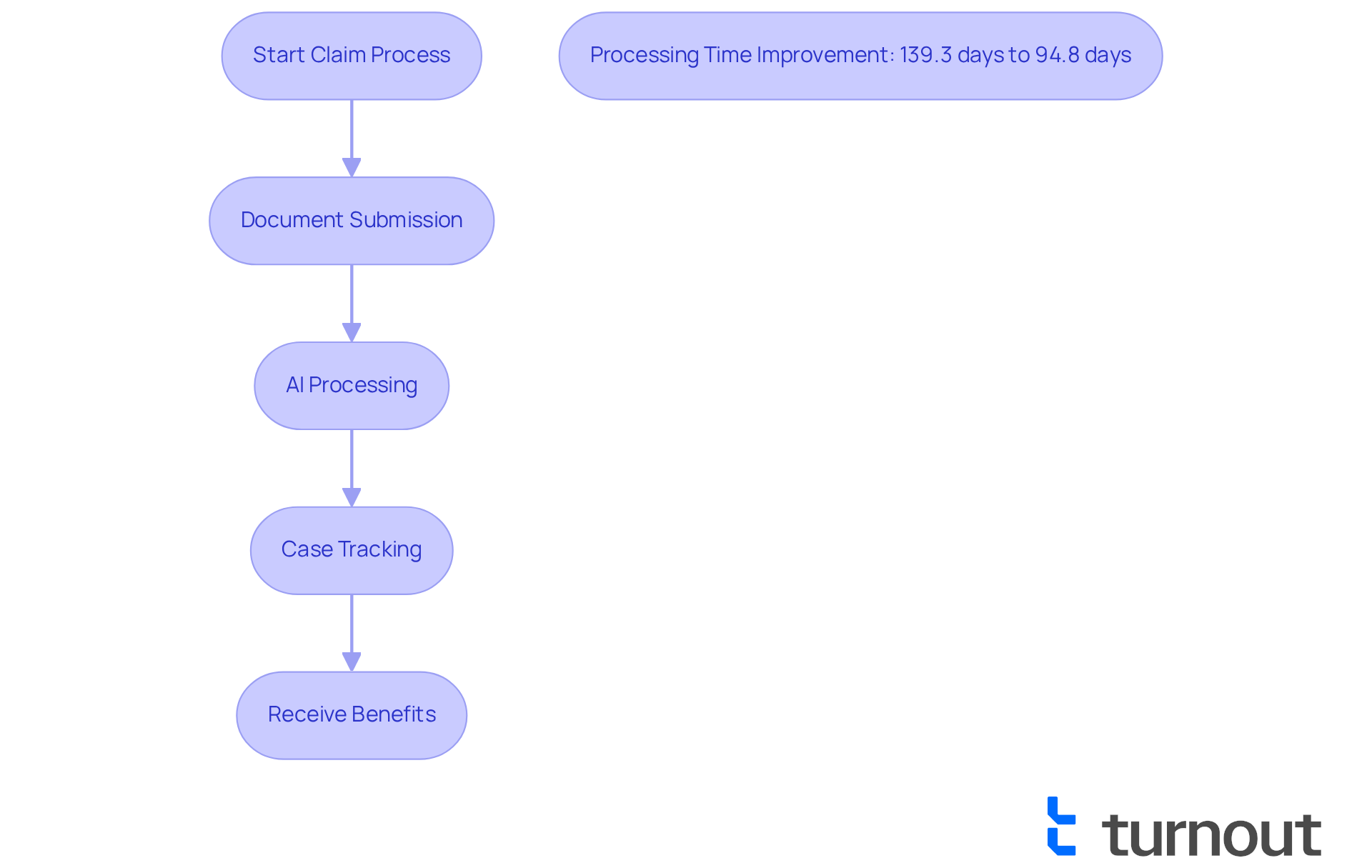
Irritable Bowel Syndrome Symptoms: Key Indicators for VA Disability Claims
If you're experiencing frequent signs of Irritable Bowel Syndrome (IBS), such as abdominal discomfort, bloating, gas, diarrhea, or constipation, know that you’re not alone. We understand that these symptoms can be distressing. It’s crucial for veterans facing IBS VA disability to carefully track their frequency and severity. This information is vital when submitting an IBS VA disability claim.
For instance, to qualify for a 10% rating, you need to show:
- Abdominal pain during bowel movements
- At least two out of six secondary symptoms occurring at least once in the past three months
A 30% rating is available if these indicators are present at least one day each week for the last three months. By comprehending these indicators, former service members can clearly express their situation related to IBS VA disability, ensuring their requests are backed by relevant medical evidence.
Healthcare providers emphasize that thorough documentation is crucial for claims related to IBS VA disability, as it can significantly enhance the chances of a successful claim. The VA relies heavily on detailed medical records to assess the severity of your condition in relation to IBS VA disability. With over 5.23 million individuals currently receiving disability compensation from the VA, the importance of comprehensive documentation cannot be overstated.
Moreover, if you have severe IBS VA disability issues that prevent you from maintaining productive employment, you may be eligible for Total Disability based on Individual Unemployability (TDIU). This highlights the critical need for precise documentation of your health conditions to secure the benefits you deserve. Remember, we're here to help you navigate this journey.
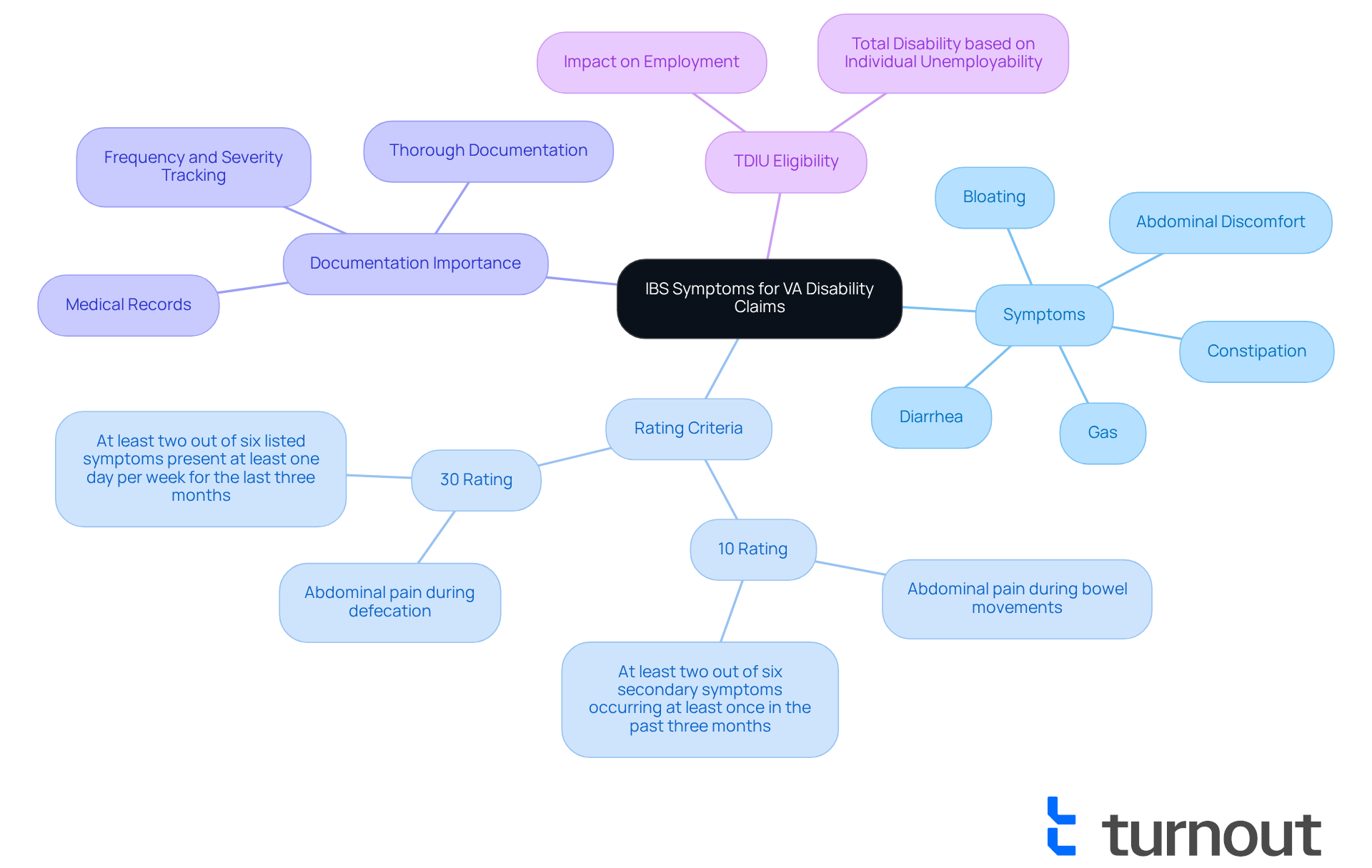
Service-Related Stressors: How They Worsen IBS in Veterans
Veterans face unique stressors throughout their service. Combat exposure, inconsistent eating patterns, and high-pressure situations can all aggravate signs of irritable bowel syndrome (IBS). Research indicates that the body's stress response can significantly alter gut function, increasing the likelihood of developing chronic gastrointestinal conditions like IBS. Notably, studies show that 25% of veterans with PTSD meet the criteria for IBS, a prevalence higher than that of the general U.S. population. This highlights a strong correlation between mental health and gastrointestinal issues.
Many veterans' claims demonstrate this connection. Numerous individuals associate their IBS VA disability issues with specific stressors encountered during service. For instance, those exposed to burn pits report persistent gastrointestinal problems, including nausea and abdominal pain, which can be traced back to their military experiences. Furthermore, gastrointestinal issues among veterans with PTSD—such as abdominal pain (36%), diarrhea (21%), and constipation (18%)—further highlight the effect of military service on digestive health.
As we look towards 2025, our understanding of how military service affects IBS VA disability symptoms continues to evolve. Updated VA rating criteria reflect advancements in medical knowledge. Veterans are encouraged to record their medical history and treatment regarding IBS VA disability when submitting requests. This information can be vital in establishing a service connection for their gastrointestinal conditions. Additionally, obtaining a nexus letter from a medical expert can strengthen claims related to gastrointestinal disabilities.
By recognizing the interplay between stressors and IBS, veterans can better advocate for their health. Remember, you are not alone in this journey. We’re here to help you secure the benefits you deserve.
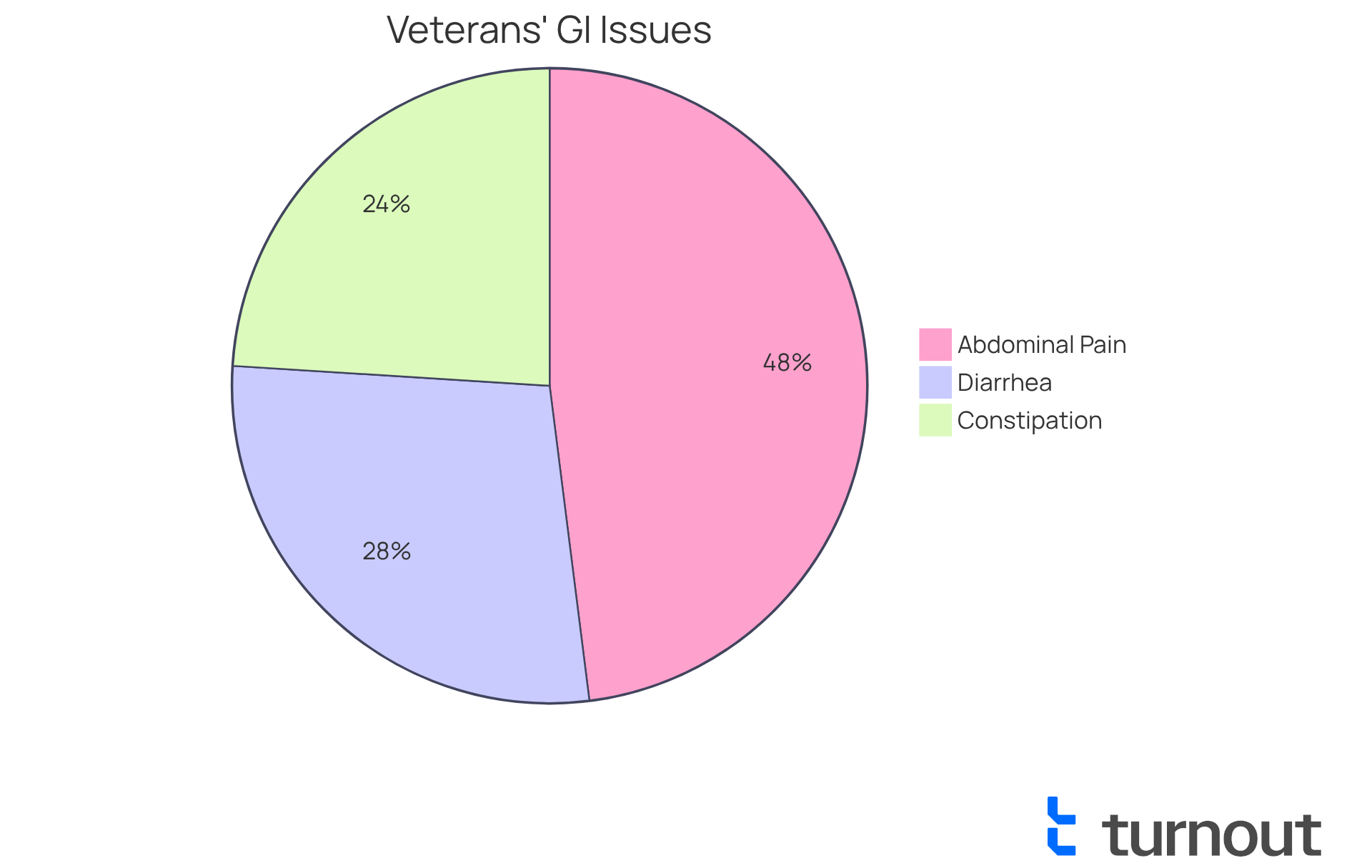
VA Rating Criteria for IBS: Understanding Your Eligibility and Benefits
Navigating the complexities of IBS VA disability can be challenging, especially for our veterans. The VA assesses IBS VA disability based on the intensity and frequency of symptoms, with ratings typically ranging from 0% to 30%. A 30% rating is reserved for serious conditions that significantly disrupt daily life. In contrast, lower ratings correspond to milder symptoms. For instance, veterans may receive a 10% rating for experiencing monthly abdominal discomfort along with other symptoms, while a 20% rating may apply for pain occurring at least three times a month.
Understanding these criteria is crucial for veterans with IBS VA disability as they evaluate their eligibility and prepare their claims. It's common to feel overwhelmed, but precise documentation of symptoms—such as changes in stool frequency and abdominal bloating—can strengthen your case. Recent updates to the rating criteria highlight the importance of clearly communicating all symptoms related to IBS VA disability during the claims process. This clarity can directly impact the outcome of your disability claims.
Remember, you are not alone in this journey. We’re here to help you navigate the process and ensure your voice is heard.
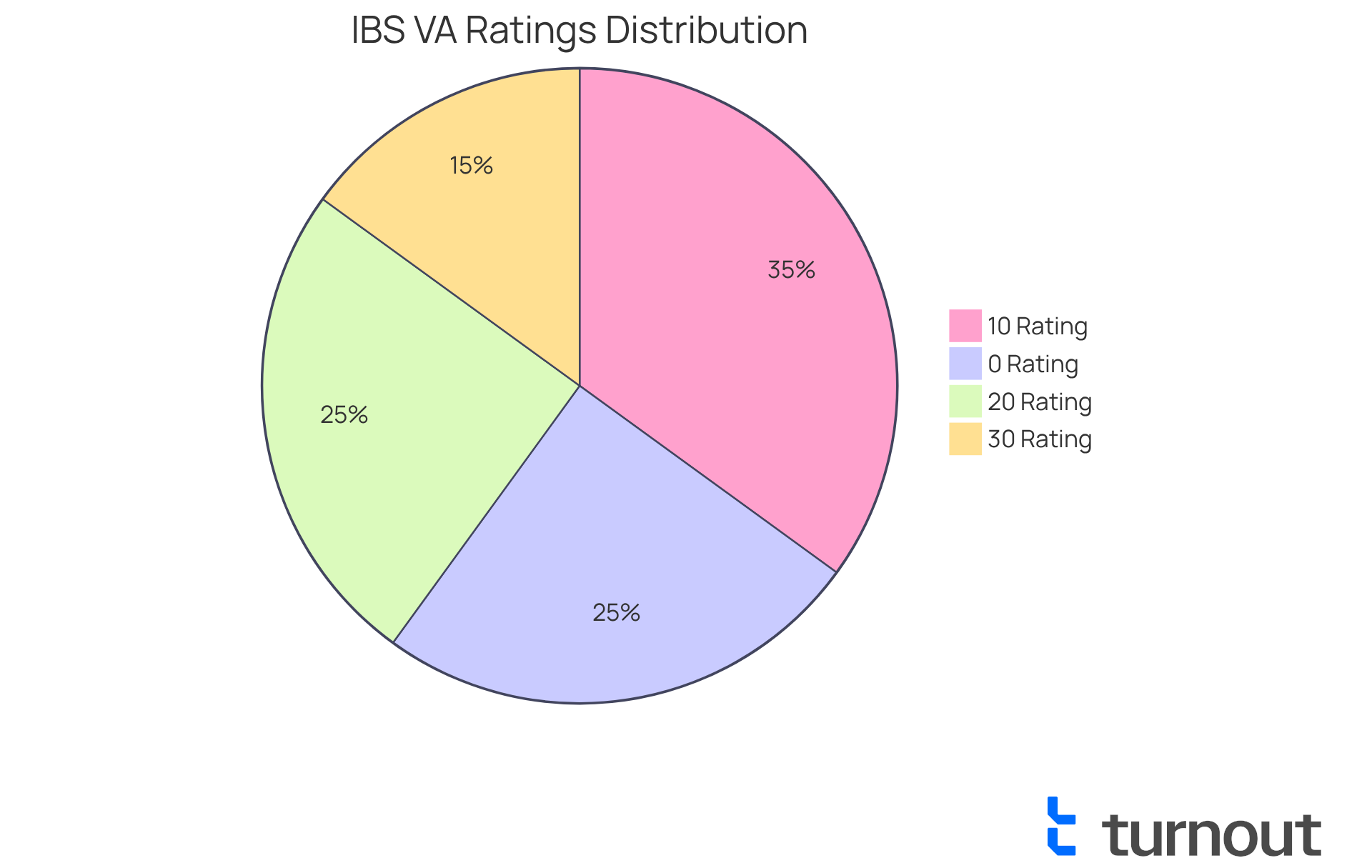
Proving Service Connection for IBS: Essential Documentation and Evidence
To establish a service connection for IBS va disability, it’s essential to gather important documentation. This includes medical records, service treatment records, and a nexus letter from a healthcare provider. This letter should clearly explain how the servicemember's IBS relates to their military service. Additionally, keeping a health journal can serve as persuasive proof, showing how IBS va disability affects daily life and supporting the credibility of the claim.
We understand that meticulous documentation is crucial. One veteran shared, "Without my medical records outlining the frequency and severity of my symptoms, my request would have been significantly less robust." This highlights the importance of thorough medical evidence in the claims process.
Effective documentation for IBS claims includes:
- Detailed medical records that outline diagnosis and treatment history.
- Service treatment records that link indications of IBS va disability to military service.
- Personal statements that describe the impact of IBS on daily functioning.
- A diary that monitors the frequency and severity of conditions over time.
- Accounts from former service members or observers that detail the frequency and effects of IBS occurrences if medical documentation is insufficient.
In 2024, the VA revised the criteria for IBS va disability ratings. Veterans now need to show at least two of six extra indicators for a compensable rating under DC 7319 concerning IBS va disability. These symptoms include changes in stool frequency, changes in stool form, altered stool passage, mucorrhea, abdominal bloating, and subjective distension. Gathering this evidence is vital for a successful claim regarding IBS va disability. We encourage veterans to proactively collect and organize their medical documentation, as it plays a pivotal role in demonstrating the legitimacy of their condition and its connection to service for IBS va disability. As one experienced individual emphasized, "The more thorough my documentation was, the clearer my case became."
Veterans should also be aware that they can file VA Form 20-0996 for a higher-level review within one year of their decision if they believe their rating is incorrect. Remember, accurate and comprehensive medical documentation is critical for maximizing your chances of receiving the benefits you deserve. You are not alone in this journey; we’re here to help.
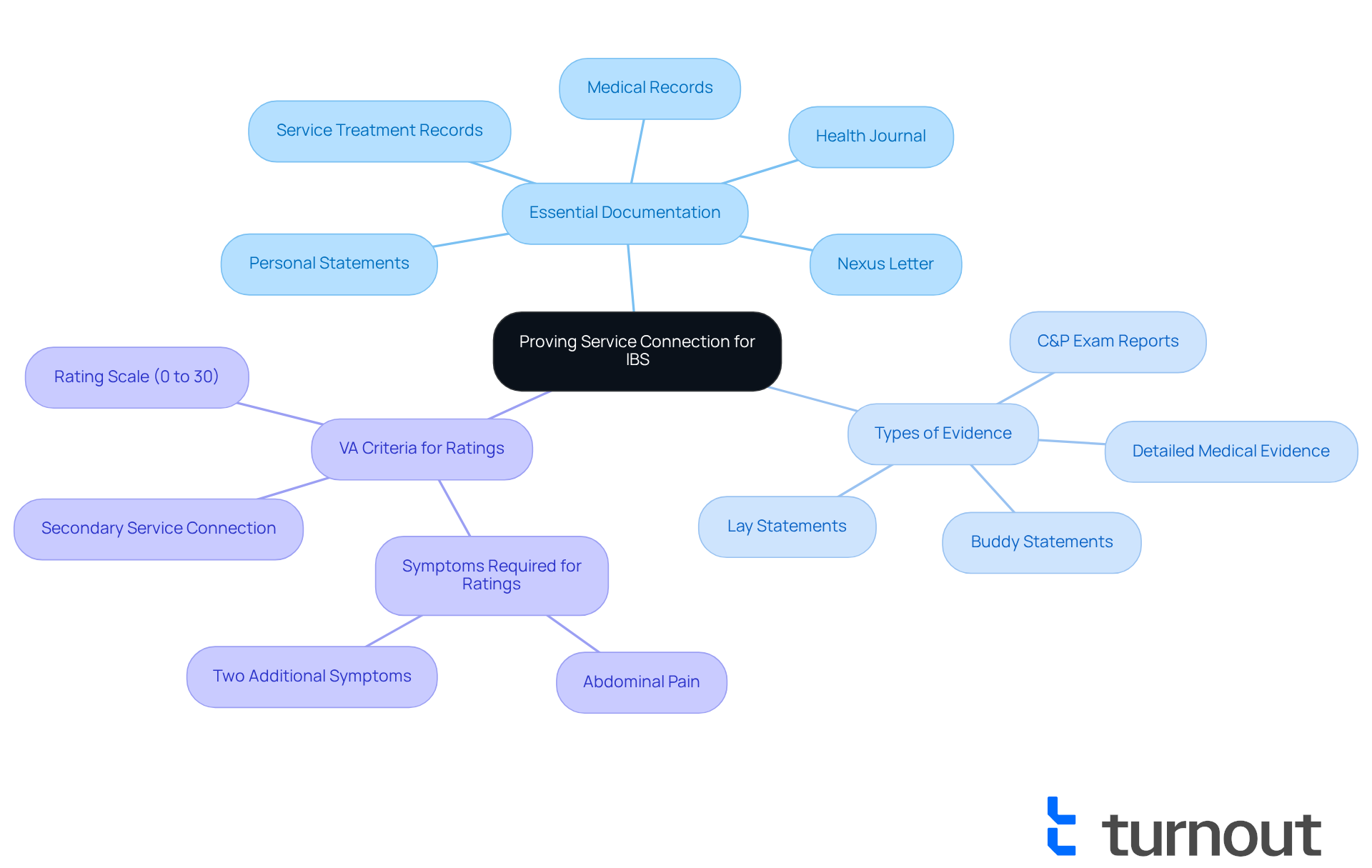
Secondary Service Connection: Linking IBS to Other Service-Related Conditions
Veterans, we understand that navigating the complexities of health issues can be overwhelming. You may qualify for a secondary service connection for IBS VA disability if you can demonstrate that your condition is linked to another service-related issue, such as PTSD or anxiety. Establishing this connection requires comprehensive medical evidence that ties your IBS symptoms to the primary condition. This method not only improves your overall IBS VA disability rating but also ensures that you receive the benefits you rightfully deserve.
Research indicates a significant comorbidity between PTSD and IBS among former military personnel. A study found that nearly 20% of veterans returning from Iraq and Afghanistan reported gastrointestinal disorders, with those experiencing PTSD being at least twice as likely to encounter these issues. Furthermore, IBS is recognized as a likely condition for veterans who served in specific Gulf War regions, simplifying the process for those who can present a current diagnosis and proof of ongoing issues for at least six months.
Medical professionals emphasize the importance of a strong nexus letter linking IBS to PTSD or anxiety. This letter should explain how the stressors faced during military service may have contributed to the onset or worsening of your IBS issues. We encourage you to gather thorough medical records, including symptom journals and testimonies from fellow service members, to strengthen your case.
Many veterans have successfully connected their IBS VA disability to PTSD or anxiety in their applications. For instance, individuals with a military background who documented their gastrointestinal problems alongside their mental health challenges have seen improved results in their disability assessments. By understanding the interplay between these conditions, you can more effectively navigate the VA application process and secure the benefits you have earned. Remember, you are not alone in this journey, and we are here to help.
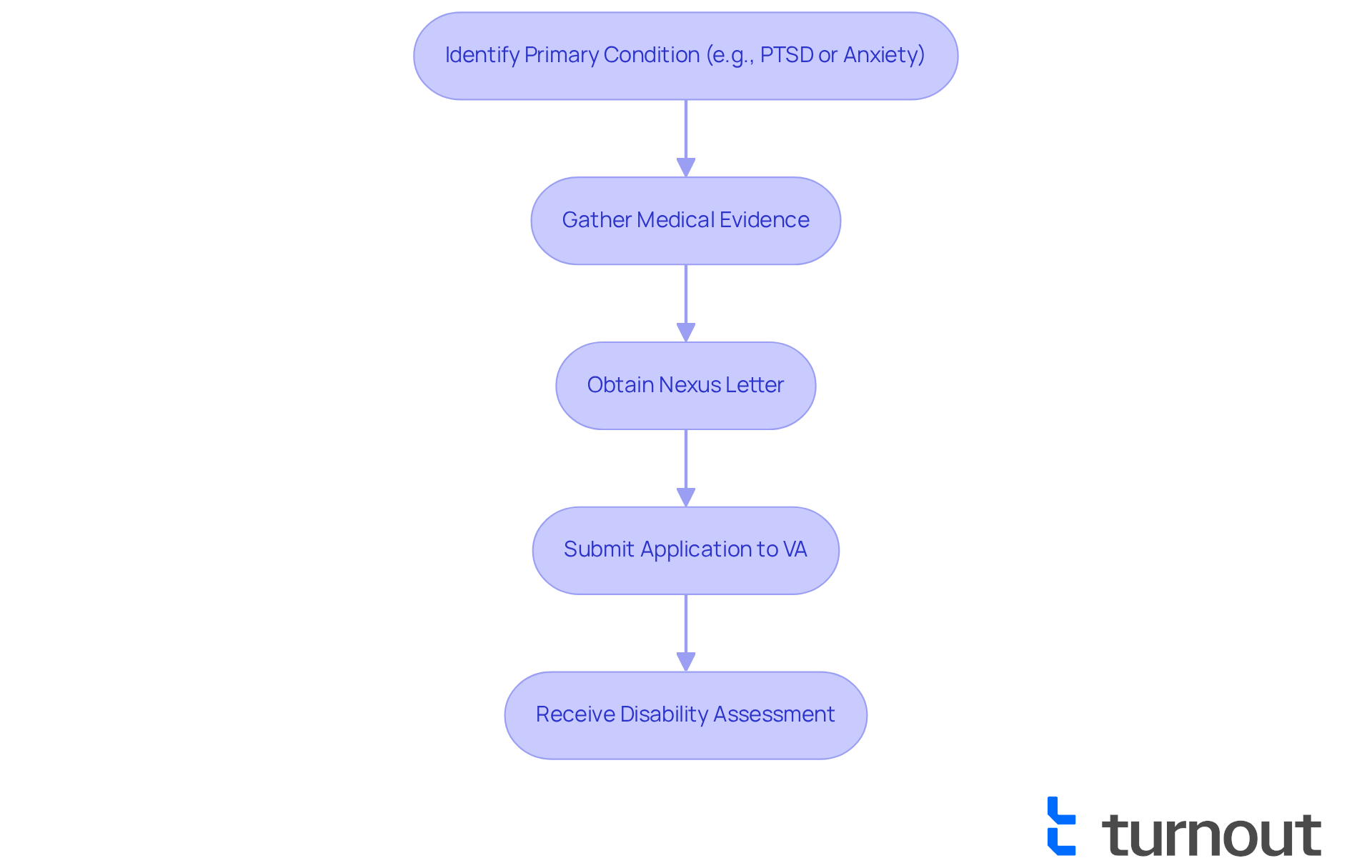
Medical Evidence: Strengthening Your IBS VA Disability Claim
Strong medical evidence is essential for a successful IBS VA disability claim. We understand that navigating this process can be overwhelming, but thorough medical records are your best ally. Veterans should ensure their records clearly outline their diagnosis, treatment history, and the intensity of their issues. This includes documentation of symptoms such as abdominal pain, bloating, diarrhea, and constipation, which are crucial for establishing the impact of IBS on daily life.
Moreover, acquiring statements from healthcare professionals that describe how IBS influences daily activities can greatly enhance your case. For instance, submissions that include an average of 10 to 15 medical records tend to have higher success rates, as they present a clearer view of your condition. It's common to feel uncertain about how to gather this information, but remember, you are not alone in this journey.
Furthermore, over 230,000 veterans are currently receiving IBS VA disability benefits, underscoring the prevalence of this condition among those who have served. Creating a medical connection that links IBS to military service or another service-related condition is often crucial for positive outcomes. The VA assigns disability ratings for IBS VA disability based on symptom severity and frequency, with specific ratings ranging from 0% to 30%.
By embracing this thorough method of collecting medical evidence, former service members can significantly enhance their likelihood of a positive result in their requests. Remember, we're here to help you through this process.
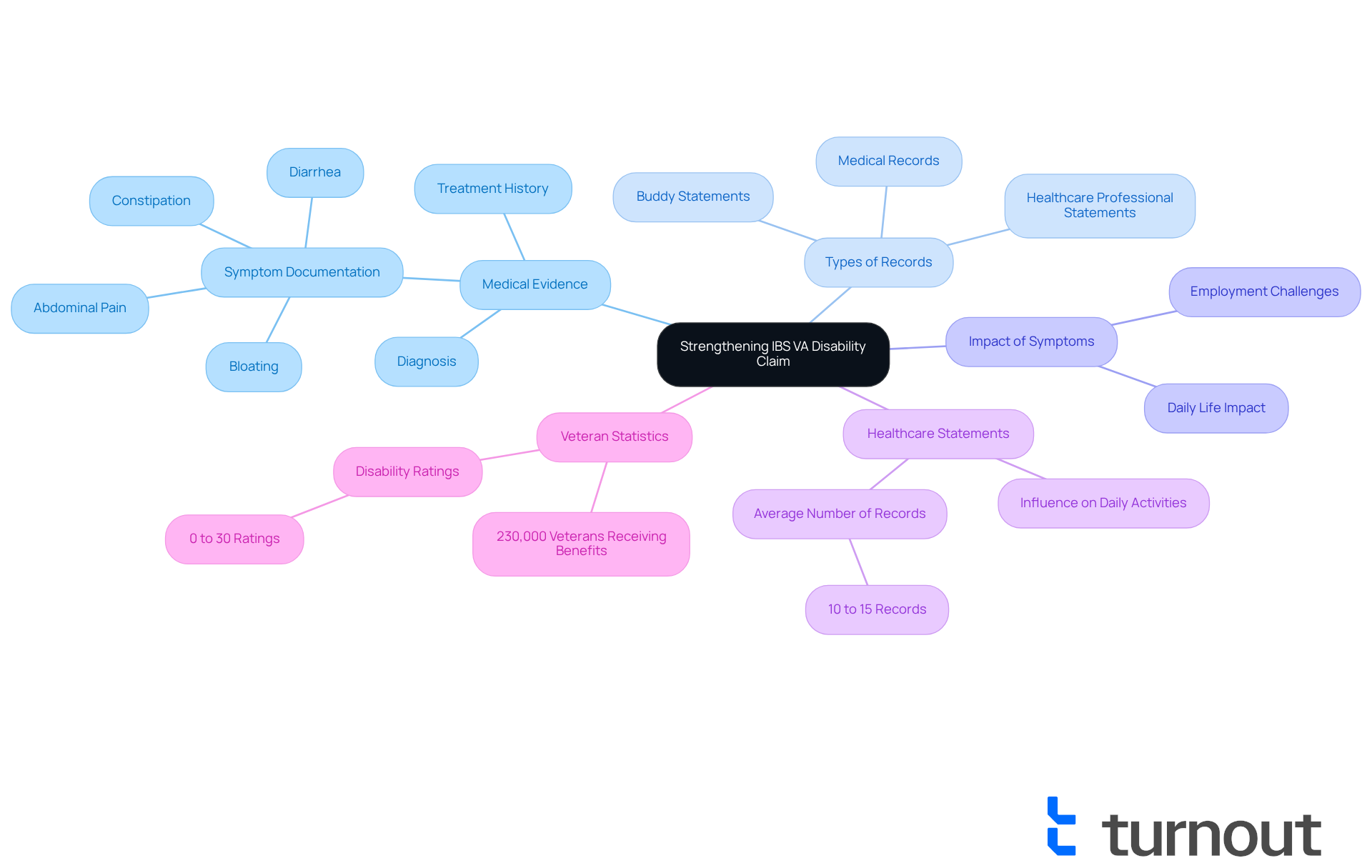
Navigating the Appeals Process: What to Do If Your IBS Claim Is Denied
If you’re a service member whose IBS VA disability claim has been denied, understanding the appeals process is essential. We understand that this can be a challenging time. Start by carefully reviewing the denial letter to pinpoint the specific reasons for the denial. This step is crucial for gathering additional evidence that directly addresses the identified issues.
The first action in the appeals process is to submit a Notice of Disagreement (NOD), which formally initiates your appeal. After that, consider requesting a Higher-Level Review or a hearing to further contest the decision. It’s common to feel overwhelmed, but you are not alone in this journey.
Statistics reveal that in 2024, approximately 62% of all Social Security Disability (SSD) applications were denied. This highlights the importance of a strategic approach in appeals. For former service members, the typical processing duration for a Higher-Level Review is about 125 days, while appeals to the Board of Veterans' Appeals (BVA) may take a year or longer. Therefore, timely action is essential.
Additionally, seeking assistance from advocacy organizations can provide valuable support during this challenging time. Many former service members have effectively navigated the appeals process with the help of skilled representatives. One individual shared, "They got my disability rating after I was denied twice. They understood precisely how to format and submit the request."
By understanding the appeals process and utilizing available resources, veterans can enhance their chances of securing the benefits they deserve, such as those associated with IBS VA disability. Remember, we’re here to help you every step of the way.
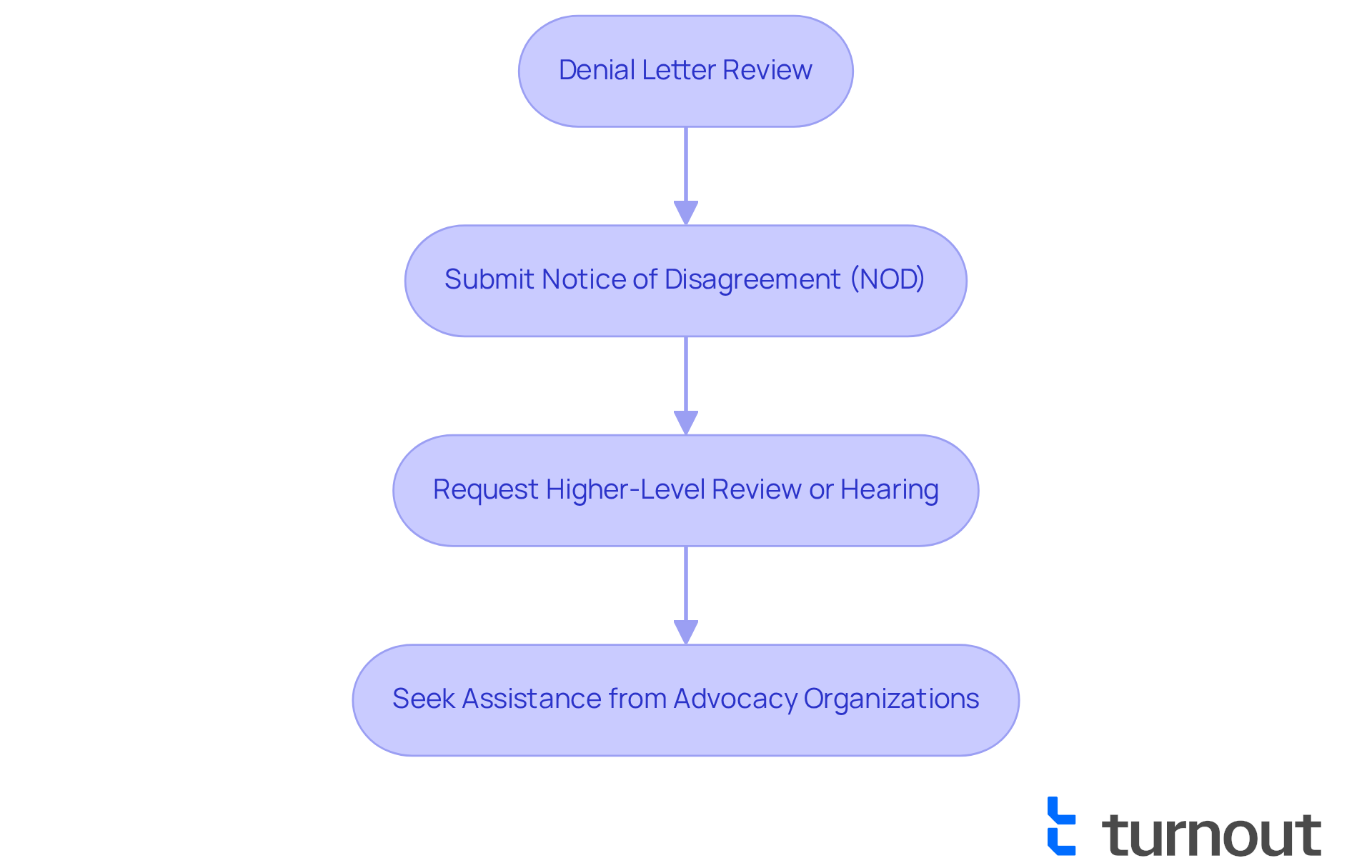
Common Pitfalls in IBS Claims: Avoiding Mistakes That Delay Benefits
Navigating the process of submitting IBS VA disability requests can be challenging for veterans, often resulting in significant delays in receiving benefits. We understand that common pitfalls can arise, such as:
- Not providing adequate medical evidence
- Missing critical deadlines
- Failing to clearly articulate the connection between military service and one’s condition
It's also common to overlook the importance of keeping comprehensive documentation of issues and treatments, which can undermine a claim.
Consider this: veterans who regularly record their symptoms and supply thorough medical records tend to see more positive results. By being proactive and meticulous in their documentation, former service members can avoid these pitfalls and enhance their chances of securing timely benefits for IBS VA disability. As one experienced individual shared, 'I discovered through tough experiences that monitoring everything significantly impacted my submission.' This underscores the importance of comprehensive preparation in the filing process.
Remember, you are not alone in this journey. We're here to help you navigate these challenges with care and support. Take the time to document your experiences—it's a vital step toward ensuring your benefits are received without unnecessary delays.
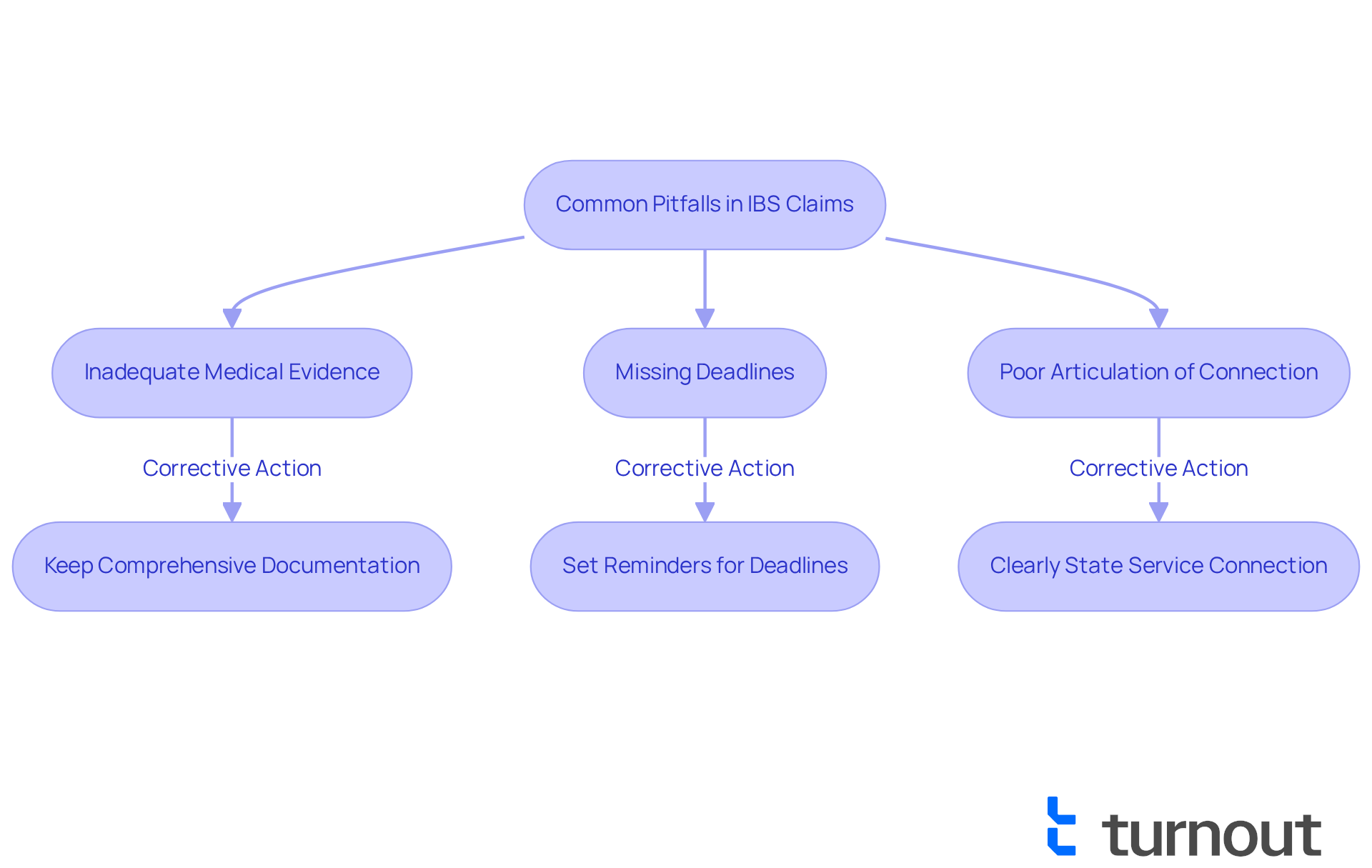
Advocacy and Support: Resources for Veterans Navigating IBS Disability Claims
Veterans often face a challenging journey when managing IBS VA disability requests. We understand that navigating this process can be overwhelming. Thankfully, there are a variety of advocacy and support resources available to simplify the experience. Turnout offers tools and services designed to assist consumers, including veterans, in navigating complex financial and governmental systems, such as tax relief options.
Veterans Service Organizations (VSOs) play a crucial role in supporting veterans with IBS VA disability. They provide invaluable assistance in submitting requests and clarifying the intricacies of the system. These organizations not only assist with paperwork for IBS VA disability but also provide insights into the process details, significantly improving the likelihood of a favorable outcome.
In addition to formal organizations, online forums and support groups serve as invaluable platforms for peer support. Here, veterans can share their experiences, exchange tips, and find comfort in the company of others who understand the difficulties of managing disability applications. This sense of community can alleviate feelings of isolation and empower former service members to pursue their benefits with renewed confidence.
Utilizing these resources not only simplifies the benefits process but also fosters a nurturing atmosphere where former service members can engage and learn from each other. This ultimately leads to improved results in their pursuit of assistance. Veterans are encouraged to explore the Fully Developed Claim (FDC) process, which can accelerate their disability compensation requests.
For immediate support, the Veterans Crisis Line is available by calling 988 and pressing 1. This service provides 24/7 assistance from qualified responders who are there to help. Additionally, Turnout's trained nonlawyer advocates are available to assist veterans with their SSD claims, ensuring they receive effective guidance in navigating these complex processes. Remember, you are not alone in this journey—we're here to help.
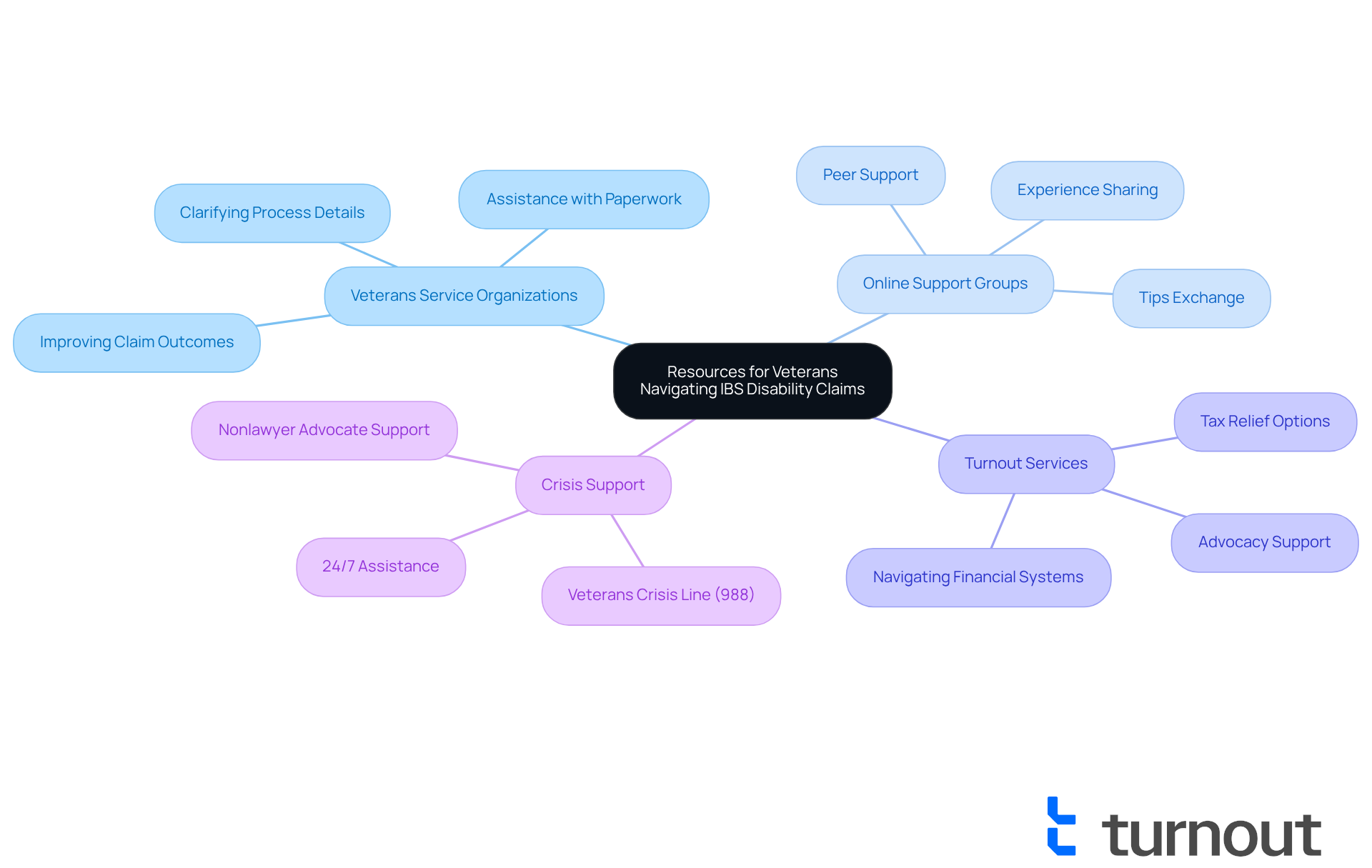
Conclusion
Navigating the intricacies of securing IBS VA disability benefits can be daunting. We understand that the journey is filled with challenges, but knowing the key steps can significantly ease the process. This article has highlighted essential strategies for veterans seeking the benefits they deserve. It emphasizes the importance of thorough documentation, understanding VA rating criteria, and leveraging available resources.
Key insights discussed include the critical nature of accurate medical records and the connection between service-related stressors and IBS symptoms. Establishing a clear service connection is vital. By diligently tracking symptoms and gathering comprehensive medical evidence, veterans can enhance their claims and avoid common pitfalls that may delay their benefits. Furthermore, utilizing advocacy organizations and support networks can provide invaluable assistance throughout this process.
Ultimately, we encourage veterans to take proactive steps in documenting their health conditions and seeking support to navigate the complexities of the VA system. Understanding the nuances of IBS VA disability claims not only empowers veterans but also ensures they can secure the benefits that support their health and well-being. Remember, every step taken toward thorough documentation and advocacy is a step closer to receiving the assistance you rightfully deserve.
Frequently Asked Questions
What is the role of Turnout in the VA disability claim process for IBS?
Turnout utilizes advanced AI technology to simplify the VA disability application process for veterans dealing with Irritable Bowel Syndrome (IBS). They automate document management and case tracking, allowing veterans to focus on their health while handling bureaucratic hurdles.
How has the processing time for VA disability applications changed as of August 2025?
As of August 2025, the average processing time for all disability applications has improved to 94.8 days, a decrease of 44.5 days from previous averages, making the process more efficient and less stressful for veterans.
What symptoms should veterans track when applying for IBS VA disability claims?
Veterans should track symptoms such as abdominal discomfort, bloating, gas, diarrhea, and constipation. The frequency and severity of these symptoms are crucial when submitting an IBS VA disability claim.
What are the criteria for qualifying for a 10% rating for IBS?
To qualify for a 10% rating, a veteran must show abdominal pain during bowel movements and at least two out of six secondary symptoms occurring at least once in the past three months.
What is required to qualify for a 30% rating for IBS?
A 30% rating is available if the qualifying indicators are present at least one day each week for the last three months.
Why is thorough documentation important for IBS VA disability claims?
Thorough documentation is crucial because the VA relies heavily on detailed medical records to assess the severity of the condition. Comprehensive documentation enhances the chances of a successful claim.
What is Total Disability based on Individual Unemployability (TDIU)?
TDIU is a benefit for veterans with severe IBS issues that prevent them from maintaining productive employment, highlighting the need for precise documentation of health conditions to secure benefits.
How do service-related stressors affect IBS in veterans?
Service-related stressors such as combat exposure, inconsistent eating patterns, and high-pressure situations can aggravate IBS symptoms. Research shows a strong correlation between stress and gastrointestinal conditions like IBS.
What is the connection between PTSD and IBS in veterans?
Studies indicate that 25% of veterans with PTSD meet the criteria for IBS, suggesting a higher prevalence of gastrointestinal issues among veterans with PTSD compared to the general population.
What can veterans do to strengthen their claims related to IBS?
Veterans are encouraged to record their medical history and treatment regarding IBS and obtain a nexus letter from a medical expert to strengthen their claims related to gastrointestinal disabilities.




